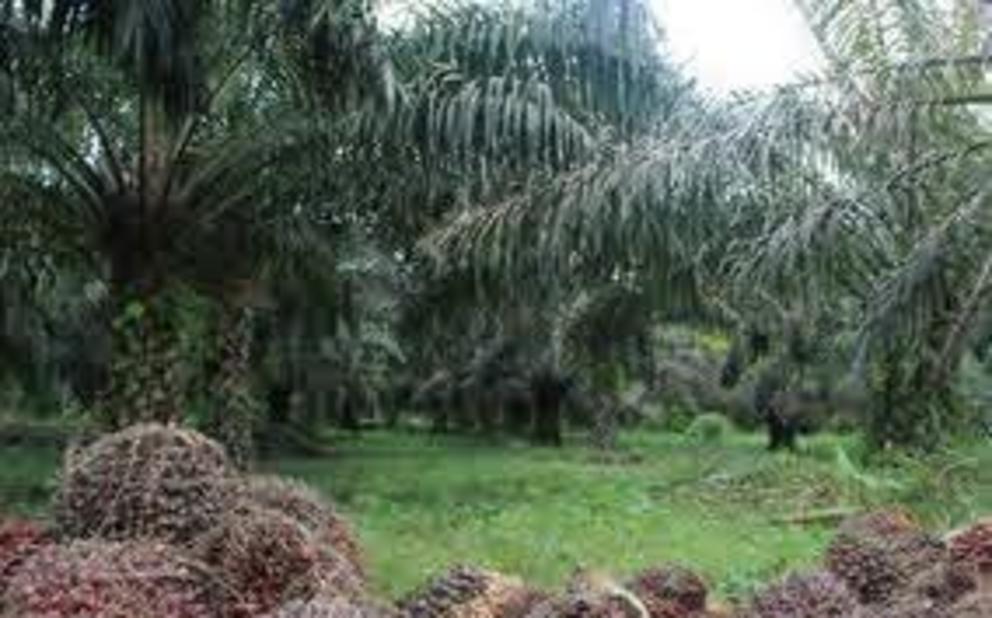Ecuador’s palm oil law a boon for producers, but not people and planet, groups say
- In July, Ecuador’s National Assembly passed the Oil Palm Law, which environmental groups and experts say benefits palm oil producers at the expense of communities, forests and the environment.
- A key concern is that the law will encourage greater deforestation for oil palm plantations, which are already a leading driver of forest loss in the country.
- Groups also say that although the new law includes monitoring and control mechanisms, the regulations to enforce this won’t be ready for several more months, and even then it’s unlikely that they will be implemented.
*This article is a collaboration between Mongabay Latam and GK, Ecuador.
At the beginning of June 2020, Ecuador’s National Assembly overwhelmingly passed the Oil Palm Law, officially called the Law for the Promotion and Development of the Production, Commercialization, Extraction, Exportation and Industrialization of Palm Oil and its Derivatives. This is the first law that seeks to regulate economic activities related to oil palm in Ecuador.
The new legislation establishes mechanisms for the commercialization of palm oil, which could include instruments of price stabilization, the creation of a technical committee to promote the sector, and a series of sanctions for noncompliance. Those sanctions could range from a fine to exclusion from the national registry of palm oil producers. The law also opens the door for damages to be assessed against palm oil companies found liable due to legal action, on top of fines that could be imposed on them by the state.
Among other things, the law prohibits: the cultivation of oil palm in water protection areas, use of banned pesticides, failure to report pesticide contamination, establishment of plantations in protected areas, and failure to engage in prior consultation with communities. But critics say it doesn’t go far enough.
“This law doesn’t envisage any change in the production model as we know it, which is destroying everything we have. It’s just more of the same,” says Malki Sáenz, coordinator of the Socioenvironmental Research Unit at Universidad Andina.
According to Sáenz, the law ignores the environmental and social context of oil palm cultivation, including its impacts on nearby communities, contamination of water sources, deforestation, and soil degradation.
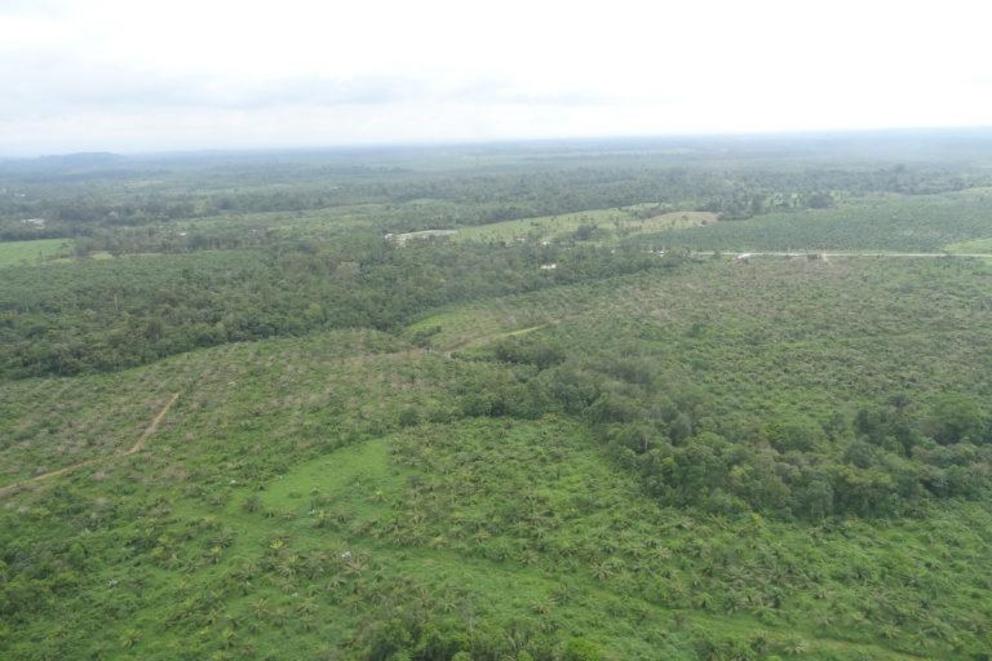 Oil palm is one of the drivers of deforestation in the province of Esmeraldas.
Oil palm is one of the drivers of deforestation in the province of Esmeraldas.
The largest oil palm plantations in Ecuador are located in the province of Esmeraldas, which also has the highest rate of deforestation in the country. According to 2019 data from the National Institute of Statistics and Census (INEC), Ecuador has 200,908 hectares (496,454 acres) of oil palm plantations. Forty percent of this is in Esmeraldas, followed by the provinces of Los Ríos (18.5%) and Santo Domingo (10%).
In 2019, Ecuador exported 187,949 metric tons of palm oil. According to the most recent figures from the U.S. Department of Agriculture (USDA), which projects global palm oil production for the year 2020/2021, it is now the third-biggest producer in Latin America, behind Colombia and Guatemala.
Social and environmental implications
Despite Ecuador’s status as a major producer, INEC’s figures show that between 2018 and 2019, the area used for oil palm cultivation shrank by 10.3%. But the long-term environmental impacts of the industry have been far-reaching. According to Global Forest Watch, between 2001 and 2019 the province of Esmeraldas lost 116,000 hectares (287,000 acres) of forest cover — a reduction of 8%.
On June 25, a group of social and environmental organizations, including the Ecumenical Human Rights Commission and the Ecuadoran Committee for the Defense of Nature and the Environment, sent an open letter to President Lenín Moreno. In it, they described palm oil as “the cause of the destruction of extensive areas of tropical forest and loss of biodiversity, contamination of soil and rivers, and monopolization of land and water for irrigation.”
The group asked Moreno to exercise his power to repeal the new law, but were unsuccessful.
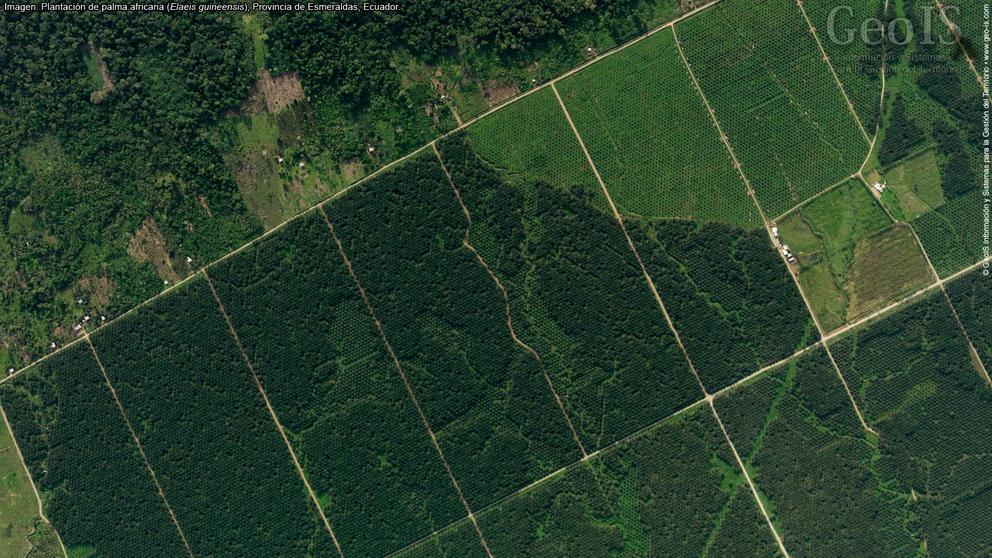 Satellite image taken of oil palm plantations to analyze changes in plant cover in San Lorenzo.
Satellite image taken of oil palm plantations to analyze changes in plant cover in San Lorenzo.
Environmentalists lobbied hard for the president to exercise his veto power. But Lenin Plaza, president of the congressional biodiversity commission and a supporter of the law, says any changes ordered by the president would have been “about improving the wording and bringing it in line with other laws; there was nothing fundamental, nothing serious.”
The letter also criticized the Oil Palm Law for including articles that it described as unconstitutional, such as one permitting access to irrigation water for oil palm cultivation through simplified procedures. This is expressly prohibited by a separate, higher regulation, the Organic Law of Hydrological Resources. Environmentalists say this article creates a “risk that water will be monopolized by the agroindustry.”
Nathalia Bonilla of Acción Ecológica, an Ecuadoran environmental organization, says communities around oil palm plantations “are extremely vulnerable” and that water access is already a serious problem for them. “Unlike other Ecuadorans, who pay for water services, but not for water itself, they have to buy their water from tankers because oil palm companies have contaminated their water sources,” she says.
The open letter also expressed concerns about provisions of the law that it says will facilitate access to forest areas where Indigenous Ecuadorans live, open the way for unauthorized planting in protected areas, and greatly diminish state control over the industry. For example, if a plantation does not allow state officials to inspect it, the law considers this to be a minor offense, not a serious one.
Other sectors speak out against the oil palm law
The organizations that signed the letter are not alone in expressing their concerns about the law to President Moreno. In a statement, WWF also called on Moreno to veto the law, describing it as inconsistent with commitments made in April 2017 by then-President Rafael Correa to WWF-Ecuador and the Roundtable on Sustainable Palm Oil (RSPO).
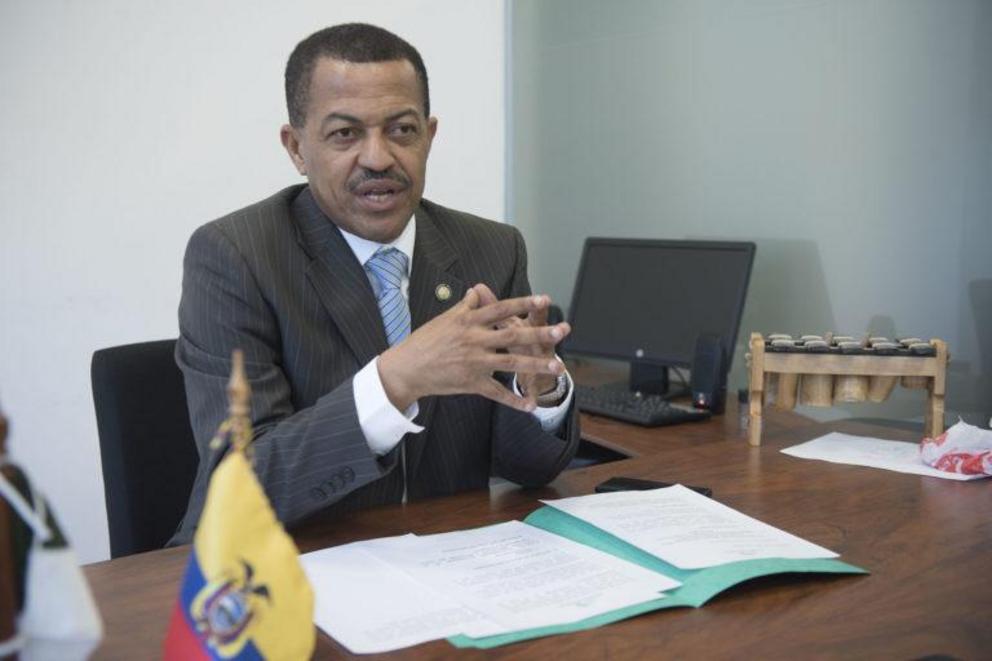 Assemblyman Lenin Plaza.
Assemblyman Lenin Plaza.
That month, the ministries of agriculture and environment agreed to “build on their hard work for the sustainable and responsible cultivation of oil palm in Ecuador.” They also established the goal of achieving a “zero-deforestation supply chain by 2025 in the Amazon region” and by 2030 in the rest of the country. Mongabay Latam asked both ministries for a statement about this commitment and the Oil Palm Law, but neither responded to the request.
Saénz of Universidad Andina says the law has two main objectives: the relaxation of labor regulations, and reduction of taxes so that companies become “competitive, in inverted commas, because they no longer have to assume certain costs and this allows them to invest in other areas,” he says.
Critics of the Oil Palm Law say giving those benefits to the industry won’t result in a better quality of life for communities. For example, Guadualito, a community in Esmeraldas, is surrounded by oil palm plantations, which grew from an area of 90 to 3,795 hectares (222 to 9,378 acres) between 1999 and 2000.
Sáenz says the money that companies save by paying lower taxes won’t be directed toward more environmentally and socially sustainable production; instead, he says, it will go into the purchase of more land.
Plaza counters that “what we are looking for is not a strict ban on increasing the size and number of plantations, but for existing plantations to improve their productivity and to avoid the expansion of plantations where possible.”
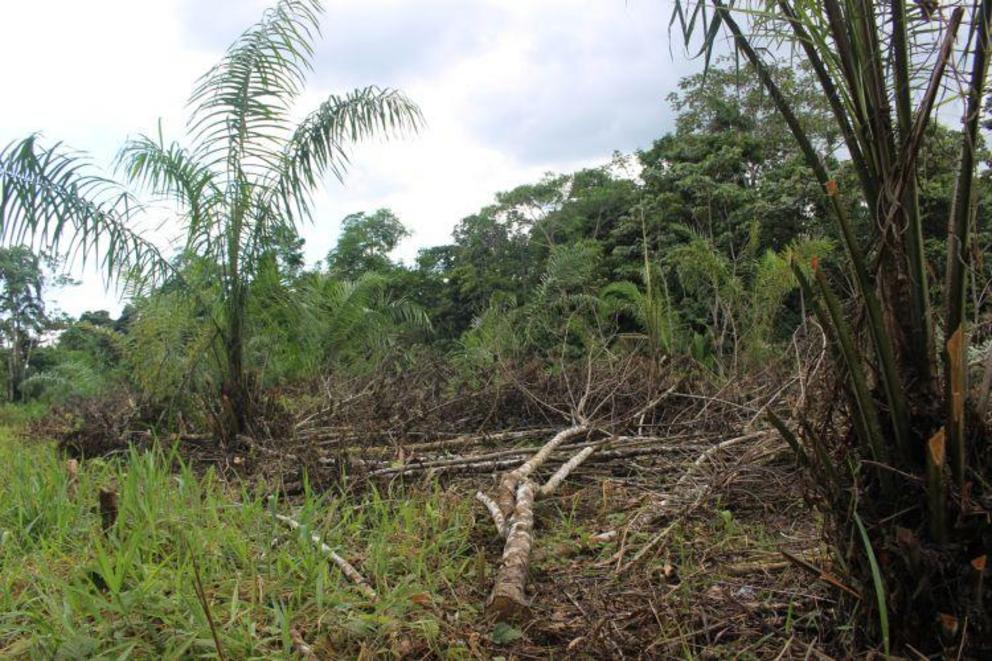 Palm plantation in Sucumbíos on land that used to be covered in forest.
Palm plantation in Sucumbíos on land that used to be covered in forest.
Saénz says he fears that, instead, the law could lead to greater deforestation in Ecuador.
Gap between law and reality
“For those who said that the environment would be affected, this law refers to a constant monitoring of water usage, to the restriction of the size of plantations and, on the contrary, the improvement of production,” Plaza, the assemblyman, tells Mongabay. “Anyone who does not comply with environmental regulations would lose their license to cultivate oil palm.”
But critics of the law aren’t convinced. They say that without effective mechanisms for enforcement and sanction, those regulations won’t have much effect. “It doesn’t matter what you put down on paper,” Sáenz says. “We could include everything we wanted, but in reality, constitutional rights and the rights of nature and the environment are mere proclamations.”
For example, one article in the law describes the monitoring plan that should be established to control contamination by wastewater from plantations and extraction plants. But it provides no details of how this mandate will be implemented or enforced.
Bonilla of Acción Ecológica says the process of palm oil extraction requires oxidation ponds, similar to those used in the oil industry, to treat contaminated wastewater. But after being used in one of those ponds, the water is no longer safe.
“People who live near plantations say that the wastewater that comes out of extractor plants is highly contaminated, that the fish get sick and die, and that they can no longer use the water. This is the case in La Chiquita and Guadualito, for example,” she says, referring to two communities in Esmeraldas.
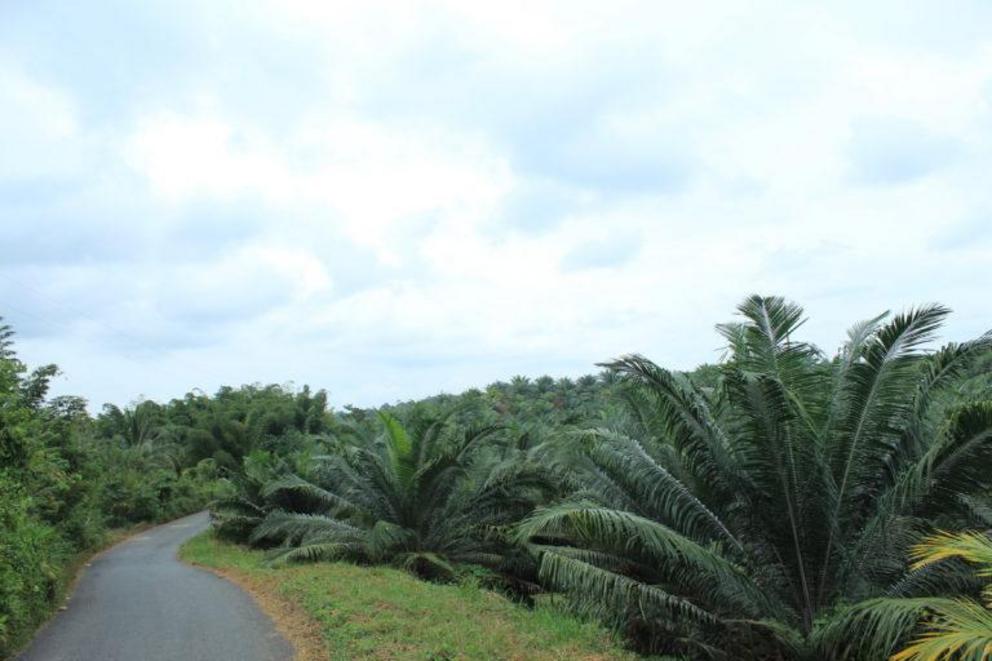 Oil palms in San Lorenzo.
Oil palms in San Lorenzo.
Enforcement and sanctions measures in Ecuador are established via regulations designed by government agencies; in this case, it would be the Ministry of Agriculture. However, this process is notoriously long and drawn-out. In fact, Plaza says he doesn’t expect the regulations related to the Oil Palm Law to be ready until July 2021 at the earliest.
This likely delay is another concern raised in the open letter, which demanded that a prudent and “peremptory” deadline be set for the regulations. It added the regulations should include “the environmental impacts of this activity, in addition to the remedial and restorative measures to be taken.”
Sáenz says it’s not just about how long the institutions take to draw up the regulations, but whether they’ll be effective at the end of the process.
“Nobody implements them because nobody is interested in regulations and the government doesn’t follow up on them. It’s just a dead letter. In my opinion, anything in the law that is not monitored or subject to any kind of control is a dead letter,” he says.
For Sáenz and other critics, the law is designed primarily to help palm oil producers pad their bottom lines. “Ecuador is always constrained by the fact that it needs to maintain dollarization and for this we need to keep the dollars coming in,” Sáenz says. “This is why we resort to the simplest and most shortsighted ways of making money.”
This story was first reported by Mongabay’s Latam team and published here on our Latam site on Sept. 14, 2020.
Article published by Maria Salazar

